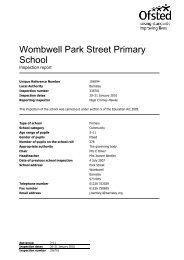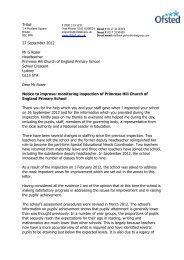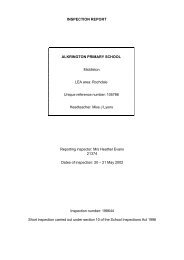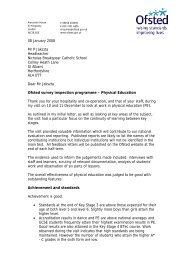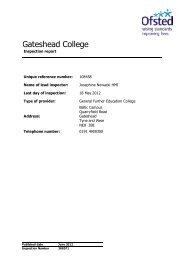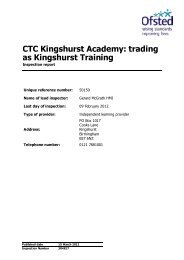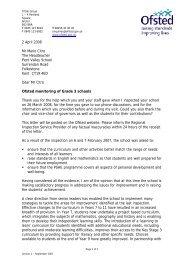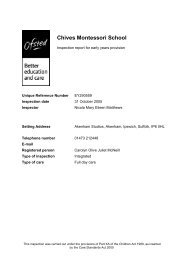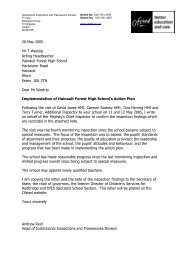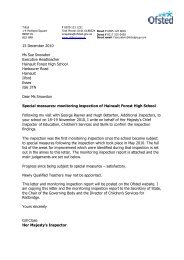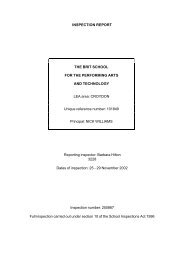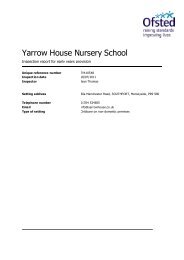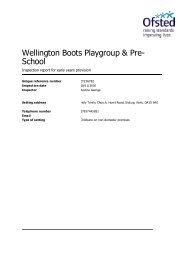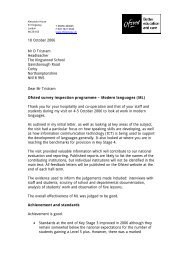2 November 2007 Mr W Chatwin Headteacher Elmete ... - Ofsted
2 November 2007 Mr W Chatwin Headteacher Elmete ... - Ofsted
2 November 2007 Mr W Chatwin Headteacher Elmete ... - Ofsted
You also want an ePaper? Increase the reach of your titles
YUMPU automatically turns print PDFs into web optimized ePapers that Google loves.
CfBT Inspection Services<br />
Suite 22<br />
West Lancs Investment Centre<br />
Maple View<br />
Skelmersdale<br />
WN8 9TG<br />
2 <strong>November</strong> <strong>2007</strong><br />
<strong>Mr</strong> W <strong>Chatwin</strong><br />
<strong>Headteacher</strong><br />
<strong>Elmete</strong> Wood BESD SILC<br />
<strong>Elmete</strong> Lane<br />
Leeds<br />
West Yorkshire<br />
LS8 2LJ<br />
Dear <strong>Mr</strong> <strong>Chatwin</strong><br />
SPECIAL MEASURES: MONITORING INSPECTION OF ELMETE WOOD BESD<br />
SILC<br />
Following my visit with Ross Parker, Additional Inspector, to your school on 31<br />
October and 1 <strong>November</strong> <strong>2007</strong>, I write on behalf of Her Majesty's Chief Inspector to<br />
confirm the inspection findings.<br />
The visit was the second monitoring inspection since the school became subject to<br />
special measures in February <strong>2007</strong>. The monitoring inspection report is attached and<br />
the main judgements are set out below.<br />
Progress since being subject to special measures – satisfactory<br />
Progress since previous monitoring inspection – satisfactory<br />
Newly qualified teachers may not be appointed.<br />
This letter and monitoring inspection report will be posted on the <strong>Ofsted</strong> website.<br />
Please inform the Regional Inspection Service Provider of any factual inaccuracies<br />
within 24 hours of the receipt of this letter.<br />
I am copying this letter and the monitoring inspection report to the Secretary of<br />
State, the chair of governors, Education Leeds and the Director of Children’s Services<br />
for Leeds.<br />
Yours sincerely<br />
Eric Craven<br />
H M Inspector<br />
Version 1 – September <strong>2007</strong><br />
T 08456 40 40 40<br />
enquiries@ofsted.gov.uk<br />
www.ofsted.gov.uk<br />
Page 1 of 6<br />
Direct T 01695 566 947<br />
Direct F 01695 729 320<br />
sdaly@cfbt.com
SPECIAL MEASURES: MONITORING OF ELMETE WOOD BESD SILC<br />
Report from the second monitoring inspection: 31 October – 1 <strong>November</strong><br />
<strong>2007</strong><br />
Evidence<br />
Inspectors observed the centre’s work, scrutinised documents and met with the<br />
principal and other senior leaders, a group of pupils, five members of the governing<br />
body, four representatives from the local authority and a national leader of<br />
education, who is working with the school in a consultancy capacity.<br />
Context<br />
In conjunction with Education Leeds, the school has been largely successful in a<br />
campaign to recruit staff. All but one teaching post has been filled and there have<br />
been appointments of a learning mentor and a parent and family support adviser.<br />
Promoted posts have been given to two higher-level teaching assistants and a lead<br />
behaviour support worker. Interviews are being held later this week for eight<br />
behaviour support workers. A post as data manager and two administrative staff<br />
positions are still to be filled. The governing body has been bolstered with the<br />
appointment of seven governors, including three new parent representatives. The<br />
number of Year 7 pupils joining the school in September <strong>2007</strong> was limited, as the<br />
local authority made temporary provision elsewhere for Year 7 pupils who might<br />
have come to the school whilst it is reviewing its provision for pupils with<br />
behavioural, emotional and social difficulties.<br />
Achievement and standards<br />
Staff have benefited from training in judging the National Curriculum levels at which<br />
the pupils are working. All the pupils have been re-assessed to give a baseline<br />
measure and a calendar of regular assessments has been established. Positive<br />
strides have been taken in ensuring the accuracy of assessments but, as the results<br />
of the first round of regular assessments are yet to be collated, staff are not in a<br />
position to be definitive about the amount of progress being made.<br />
The progress of pupils was good in just under a half of the lessons observed and<br />
satisfactory in about half. It was inadequate in a small number of lessons<br />
The number of pupils achieving five or more external accreditations is on the rise.<br />
Five pupils achieved GCSE grade D: two in mathematics, two in art and one in<br />
English, and this too represents an increase on the previous year. Courses leading to<br />
external accreditation are commencing earlier with some pupils gaining entry-level<br />
qualifications in Year 9 and GCSE qualifications in Year 10. An increasing range of<br />
GCSE courses is being offered this year, with information and communication<br />
technology (ICT), music and religious education being added to current GCSE<br />
courses in English, mathematics, science and art. There are early indications that an<br />
increasing number of pupils are going into further education, training or employment<br />
when they leave school.<br />
Page 2 of 6
Personal development and well-being<br />
The attendance of the pupils, overall, is stubbornly low at 70%. It is much lower at<br />
the Stonegate Road site. The school is making strong efforts to tackle this, but feels<br />
it has been hampered by staffing issues in the local authority’s attendance service.<br />
Each pupil now has an attendance target and the school’s attendance policy has<br />
been reviewed. The number of fixed-term exclusions and the number of pupils<br />
receiving exclusions is high, but reflects the firm stance being taken by the school in<br />
setting out its stall with regard to what is and what is not acceptable behaviour.<br />
Generally, the attitudes and behaviour of the pupils in lessons are satisfactory. The<br />
sporadic challenges posed by individual pupils are managed effectively. Nevertheless,<br />
there are a few other pupils who display low-level disruption in the lessons which are<br />
not managed successfully by some staff. In these cases, expectations as to what is<br />
acceptable and what is not are not conveyed clearly enough to the pupils at the<br />
outset of the lesson. Equally, there is insufficient reference made to behavioural<br />
targets and the recently revised ‘bonus’ system during the lesson in order to curb<br />
this behaviour. However, the bonus system is applied consistently at the end of<br />
lessons and the pupils are responding well to the points and raffle tickets they can<br />
earn. The school has begun to gather data on the issuing of points and incidents of<br />
misbehaviour but has not enough yet for it to be analysed thoroughly.<br />
Quality of provision<br />
Clear systems are in place to develop a consistent quality of teaching and learning<br />
across all subjects. These are beginning to have an impact on assessment, the<br />
matching of work to pupils’ needs and the academic targets for pupils. There are<br />
areas of well-developed practice, but variability remains. There is a routine for<br />
explaining what pupils are expected to learn within lessons and then discussing how<br />
far they have progressed at the end of the lesson. In some lessons, such as science<br />
and music, teachers’ plans identify the skills and concepts individual pupils should<br />
master. Teachers are referring to boundaries between different levels of response<br />
when they talk to pupils and encouraging them to aspire to the next level. As yet,<br />
pupils see the next steps more in terms of behaviour or concentration rather than on<br />
mastering skills or concepts. The very strong relationships and good role models<br />
provided by staff are more influential in ensuring good behaviour than the<br />
attractiveness of the work. However, in more lessons teachers are exploiting a range<br />
of learning styles and using technology – film clips for example – to make the tasks<br />
more appealing. There is still some lack of confidence in ICT on the <strong>Elmete</strong> Lane site<br />
and technical difficulties are inhibiting the use of ICT at the Stonegate Road site. This<br />
is hampering attempts to make the work more engaging. Teachers make good use of<br />
praise to encourage and motivate pupils and work well with behaviour support<br />
workers to maintain momentum within lessons. When faced with significant<br />
resistance on the Stonegate Road site, the adults are calmly persistent and find<br />
every opportunity to draw pupils into cooperating.<br />
In some lessons teachers are not providing enough challenge. Sometimes this is<br />
because they devise tasks which keep pupils busy in order to reduce opportunities<br />
Page 3 of 6
for them to distract each other. Some pupils find these tasks too simple. On other<br />
occasions the lack of challenge stems from teachers not wishing to intimidate pupils.<br />
Staff can become over-protective, offering answers to questions rather than leaving<br />
space for pupils to take more responsibility for their response. However, there were<br />
good examples of more effective practice when teachers asked questions and left<br />
time for the pupil to reflect before answering. Teachers were conscious of the need<br />
to maintain a good pace, used questioning skilfully to draw pupils into the activities<br />
and offered opportunities for them to evaluate their own work.<br />
A similar systematic approach is supporting the development of the curriculum. Very<br />
thorough monitoring of medium and long-term planning has identified areas of the<br />
curriculum where planning needs to be improved to give pupils a consistent<br />
experience. The programme for personal social and health education (PSHE) has<br />
been fully planned and agreed with good support from Education Leeds’ consultants.<br />
The priority area of sexual and relationships education is well under way. After<br />
internal monitoring identified fundamental flaws in the provision for physical<br />
education (PE), the scheme of work has been radically changed to emphasise skills<br />
rather than activities in both the lesson plans and assessment approaches. Support<br />
staff are undertaking specialist PE training and the school is offering pupils<br />
opportunities to train as junior sports leaders. Senior managers are exploring ways of<br />
providing further PE opportunities in partnership with a nearby secondary school.<br />
Recent appointments of subject leaders for PE and PSHE have added stability to<br />
these improvements. An after-school club in creative arts, open to all pupils, has<br />
been established this term in conjunction with the youth service.<br />
The newly appointed parent and family support worker has been successful in<br />
liaising with some individual families and this has resulted in improved attendance in<br />
these cases. The impact of the recently established multi-disciplinary team within the<br />
school is yet to be evaluated, although early evidence suggests this is a positive<br />
development. A pilot project pulling together the pupils’ behaviour, academic,<br />
attendance and healthy and safe living targets into an individual learning plan is<br />
being prepared for implementation for Key Stage 3 pupils at the Stonegate Road site.<br />
This involves the pupils, parents and carers and has much promise.<br />
There are examples of good written feedback being given to pupils about their work.<br />
The best clearly identifies what they have mastered, the level of their work and also<br />
describes what they need to do to improve further. However, this practice is<br />
inconsistent across subjects and in some cases within a subject.<br />
Progress on the areas for improvement identified by the inspection in February <strong>2007</strong>:<br />
� Ensure pupils achieve well by improving the quality of teaching and the<br />
curriculum – satisfactory.<br />
Leadership and management<br />
The senior staff are working well as a team and, as a consequence, are delivering<br />
consistent messages to staff. Staff are responding well to the challenges set and<br />
they are fully involved in school development through their membership of various<br />
‘change’ groups, such as those looking at teaching and learning and the<br />
Page 4 of 6
management of behaviour. Senior staff are ensuring that good practice in school is<br />
shared, as well as identifying where development is needed. A good example is the<br />
form used to record lesson observations. This is detailed and clear and concludes<br />
with strengths, areas for development and practice to be shared.<br />
The school’s records show that the quality of teaching is not less than satisfactory,<br />
with about half being good. Inspectors also found about half of the teaching to be<br />
good but also found a small amount of teaching to be inadequate. Substantial<br />
changes in staffing make comparisons of the quality of teaching over time difficult.<br />
Nevertheless, there is evidence that the teaching is improving.<br />
Monitoring by seniors leaders, along with guidance from Education Leeds, has<br />
improved the consistency of planning. Subject leaders are furthering their influence<br />
by observing lessons delivered by other teachers and in managing assessment data.<br />
Although there remain inconsistencies between subjects, often associated with<br />
permanency of staffing, subject leaders are leading their subjects with more<br />
confidence.<br />
A policy and process for performance management has been agreed, with suitable<br />
links between staff’s performance objectives and whole-school priorities. The school<br />
improvement plan is currently based on the key areas for development from the last<br />
inspection. These plans are regularly and effectively monitored by the governing<br />
body, the task group, which comprises senior staff and local authority officers, and<br />
also the joint review group, chaired by a senior officer from Education Leeds.<br />
The school has responded well to the points for further improvement identified at the<br />
last monitoring inspection. The monitoring of pupils’ placements with alternative<br />
providers has improved. Effective work has been done to make the assessments of<br />
the pupils’ work more accurate. There have been improvements in the use of<br />
academic targets in lesson plans, although this practice is variable.<br />
The governing body is at full complement. It has been strengthened by the<br />
appointment of new governors, some with relevant expertise. The training governors<br />
have received has been helpful in developing their skills and understanding.<br />
Members are now in a better position to hold the school to account in their work as<br />
‘critical friends’.<br />
Progress on the areas for improvement identified by the inspection in February <strong>2007</strong>:<br />
� Establish robust systems to monitor the effectiveness of the SILC and its impact<br />
on learning and achievement – satisfactory.<br />
� Make the workload of the leadership team more equitable and effective – good.<br />
External support<br />
There has been bespoke support for subject leaders, from Education Leeds’ national<br />
strategies’ consultants. Their action plans to support the school are helpful and map<br />
out their commitment for the rest of the school year. The benefit of this support is<br />
already evident in improved assessments, planning and monitoring. As members of<br />
the task group and joint review group, officers from Education Leeds are helping<br />
Page 5 of 6
keep the school on its improvement track. The national leader for education has<br />
been particularly effective in his work with the governing body.<br />
Priorities for further improvement<br />
� Set clear expectations and use the bonus points system and behaviour targets to<br />
better effect in order to reduce the low-level disruptions seen in some lessons.<br />
Page 6 of 6



